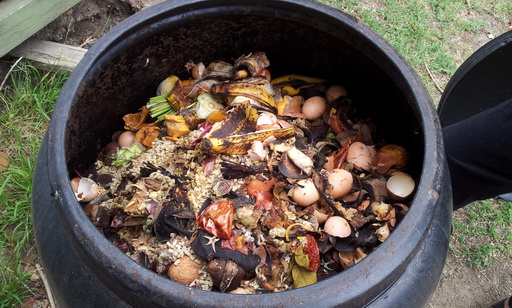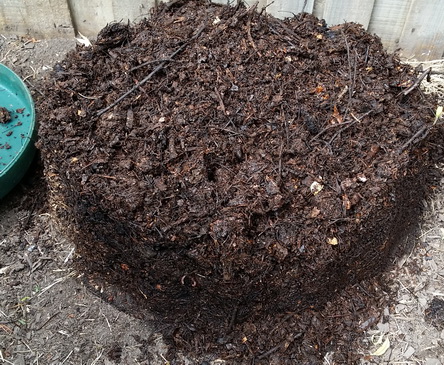Cold composting refers to simply adding only kitchen scraps, with the occasional addition of dry or carbon-based materials. It does end up with compost - eventually, as long as the balance of ingredients is maintained.
Many people are well-intentioned but don't make good compost because they employ the "fill and forget" technique. This is just dumping kitchen scraps in a compost bin, with nothing else. As you would attest, if you have used this method, it doesn't lead to a very nice outcome! It can lead to the following problems if not looked after regularly.
Why is my compost…
- left with half-decomposed big lumps?
Adding smaller pieces to the bin should ensure that it all decomposes evenly. Avoid avocado seeds, pineapple tops, large twigs or woody items unless they can be crushed or chopped before adding. Crush eggshells. Cut up garden prunings.
- so revoltingly smelly?
This could be due to an imbalance in the compost contents, with too much nitrogen-containing materials (green stuff, usually too many kitchen scraps) and not enough carbon (brown or dry stuff). Adding more of the dry stuff in the form of crumpled newspaper, old straw, torn up egg cartons and pizza boxes or dried autumn leaves will help. As a guide, after a week of adding kitchen fruit and veg peelings, you will need to add 3 times the volume of dry stuff to get the balance right.
TURNING the contents will also help with minimising smells. Use a garden fork or special compost tool to aerate the heap at least weekly and this will accelerate the compost making and help avoid the revolting smells.
- taking SO long to do anything?
This could be because:
- The contents could be too dry. Add water, preferably with some high in nitrogen compost activator added at the same time (eg blood and bone, Dynamic Lifter, loads of coffee grounds).
- The contents could be too wet and slimy. See above for solution.
- It is decomposing unevenly. Turn the contents over to introduce air (oxygen) into the mix.
- crawling with ants and other creepy crawlies?
The presence of ants means that the heap is too dry. Use a watering can to thoroughly wet the contents without saturating them. Turn the contents over so that the drier edges get wet evenly. Ants and slaters (and the many other insects that are in your compost) are not harmful but they do indicate that your compost will not decompose rapidly enough. They do help decompose the contents too!
- plagued with rats/mice/blowflies/maggots?
Cooked and processed foods attract vermin and the heat from your compost makes a welcoming place for rats and mice to nest. Don’t add any cooked scraps, especially bread, cakes, cheeses, fish or meat. Rats and mice usually enter the bin by digging underneath, so fasten a piece of fine-meshed wire under the bin before filling it; or get a hungry cat! Alternatively, use a fully enclosed bin such as the Aerobin or any of the rotating bins so that vermin can't enter.
Remember that, like many things in life, the more effort you put into something the better the outcome and this is true for making great compost too!

